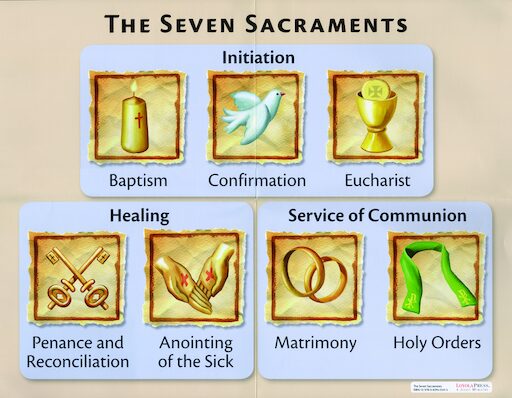
The Seven Sacraments: Essential Rites of Passage in Catholicism
|
|
Time to read 5 min
|
|
Time to read 5 min
The Catholic Church views the seven sacraments as sacred encounters with God's grace, marking significant moments throughout a believer's life. These sacraments are not mere rituals, but channels through which God's love and power flow, strengthening our faith and guiding us on our spiritual journey. This blog delves into each sacrament, explaining its meaning, purpose, and significance in the life of a Catholic.
Sacraments are visible signs instituted by Jesus Christ to signify and impart invisible grace. Grace, in Catholic theology, refers to God's free gift of love and supernatural help, enabling us to live according to His will. The outward rituals of the sacraments, such as water in baptism or bread and wine in Eucharist, symbolize the invisible spiritual realities bestowed upon the recipient.
The seven sacraments are traditionally categorized into three groups:
1. Baptism: Baptism is the gateway to the Christian life. Through the pouring of water and the invocation of the Holy Trinity, original sin is cleansed, and the recipient becomes a child of God and a member of the Church. Baptism signifies a spiritual rebirth and opens the door to receive the other sacraments.
2. Confirmation: Confirmation strengthens the grace received in Baptism. Administered by a Bishop, it signifies the empowering presence of the Holy Spirit. Confirmation deepens a young person's faith and equips them to be a mature witness to Christ in the world.
3. Eucharist: The Eucharist, also known as Holy Communion, is the central sacrament of the Catholic faith. Catholics believe that during the Mass, bread and wine are transformed (transubstantiated) into the real body and blood of Jesus Christ. Receiving Eucharist nourishes our spiritual life, strengthens our connection with Jesus, and fosters unity within the Church community.
4. Penance (Reconciliation): Penance, also referred to as Confession, offers an opportunity to receive God's forgiveness for sins committed after Baptism. Confessing our sins to a priest and receiving absolution restores our relationship with God and grants peace of conscience.
5. Anointing of the Sick: The Anointing of the Sick, formerly known as Extreme Unction, is a sacrament for those experiencing serious illness or facing death. Through the anointing with blessed oil and prayers offered by a priest, the sick receive comfort, spiritual strength, and the opportunity for healing, if it be God's will.
6. Holy Orders: Holy Orders is the sacrament through which men are ordained as deacons, priests, or bishops. This sacrament equips them to serve the Church in specific roles, such as celebrating Mass, administering the sacraments, and leading the faith community.
7. Matrimony: Matrimony is the sacrament that blesses the marital union between a man and a woman. It signifies the lifelong covenantal love between spouses, reflecting the relationship between Christ and the Church. Through Matrimony, couples receive the grace to love each other selflessly and build a Christian family.
The Catholic Church emphasizes the importance of proper preparation before receiving certain sacraments, particularly Baptism, Confirmation, Eucharist, and Matrimony. This preparation may involve attending classes, participating in retreats, and engaging in spiritual reflection. Active participation in the celebration of the sacraments is also encouraged, allowing individuals to fully experience the grace being offered.
The seven sacraments are not isolated events but rather milestones along a lifelong journey of faith. From the initial commitment in Baptism to the ongoing nourishment received through Eucharist, the sacraments provide a framework for deepening our relationship with God and living out our Christian calling. By actively participating in the sacraments, we open ourselves to the transforming power of God's grace, allowing it to guide and strengthen us on our spiritual path.
Beyond the individual significance of each sacrament, there's a broader importance they hold within Catholicism:
In today's fast-paced world, the sacraments offer a much-needed anchor. They provide opportunities for reflection, connection, and a renewed sense of purpose. The emphasis on forgiveness in Penance and the call to selflessness in Matrimony offer valuable guidance in navigating the complexities of modern life.
However, the importance of the sacraments extends beyond personal benefits. They serve as a powerful witness to the world, showcasing the values and beliefs that Catholicism upholds. The public celebration of sacraments, such as weddings or baptisms, can spark curiosity and even inspire others to explore the Catholic faith.
This blog provides a basic overview of the seven sacraments. If you're interested in learning more, here are some suggestions:
Ultimately, the seven sacraments are gifts from God, designed to enrich our lives and guide us on our spiritual path. By actively participating in these sacred encounters, we open ourselves to the transformative power of God's grace and become active members of the Catholic faith community.